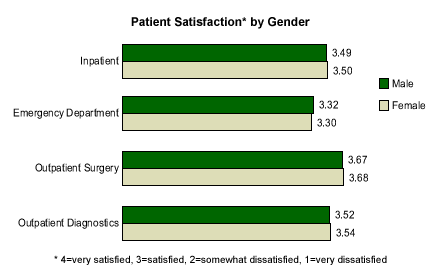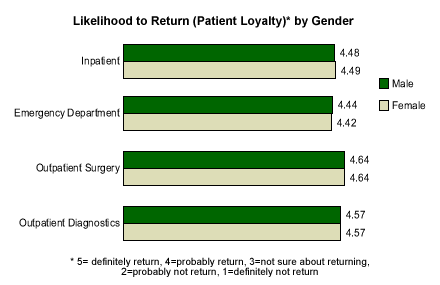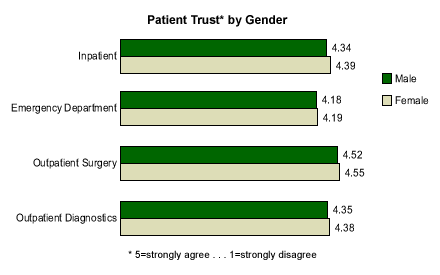From a healthcare treatment perspective, men and women often have different needs. However, does this mean that patient satisfaction and loyalty differ by gender? That is, do hospitals tend to be better at satisfying or creating loyalty in one gender than in the other?
To investigate this question, Gallup examined a subset of its 2001 patient satisfaction and loyalty database by gender. We analyzed data from four service areas: inpatient, emergency department, outpatient surgery, and outpatient diagnostics. Results of three outcome measures -- overall satisfaction, trust in the hospital providing quality care, and likelihood to return to the same hospital -- were examined for each service area.
Overall Satisfaction
As the following graph indicates, a patient's gender has no discernable impact on his or her ratings of overall patient satisfaction.

Although the difference between male and female overall patient satisfaction scores is small, it is interesting to note that the emergency department is the only area rated higher by men than women. This finding is intriguing, given that unlike women, men tend to use the emergency department for episodic care, rather than maintaining an ongoing relationship with a primary care physician.
Gallup research has consistently found that men are less likely than women to seek preventative medical care. (See "What is an Ounce of Prevention Worth?" and "Cancer Care: Do Men Still Lag?" in Related Items.) Male scores on satisfaction with emergency department care indicate that relative to women, men are fairly satisfied with the care they receive in emergency departments and are likely to continue using them as a substitute for routine doctor visits.
Likelihood to Return to the Same Hospital
As with overall patient satisfaction, there is little variation by gender in patients' likelihood to return to the same hospital (defined as patient loyalty).

Again, as was the case with overall patient satisfaction, men tend to score the emergency department slightly higher than women do.
Trust in the Hospital Providing High-Quality Care
If gender has any meaningful impact on patient satisfaction, it is on the measure of trust in the hospital providing high-quality care.

There is more variation on this measure than on either overall satisfaction or loyalty. Although the difference is most notable in inpatient service (.05) and least notable in emergency department service (.01), women tend to have higher trust than men in the ability of the hospital to provide high-quality care. The minimal differentiation in emergency department scores likely reflects the particularly low levels of both satisfaction and trust in the emergency department between both genders.
Key Points
Clinically speaking, men and women do have significantly different patient service needs. However, Gallup patient satisfaction and loyalty scores show that there is no substantive difference in the ability of hospitals and their staffs to meet these needs for men and women. The only notable variation is that women tend to have higher levels of trust in inpatient services than men do. Since women are often the healthcare decision-makers in their families, this finding is good news for hospitals.